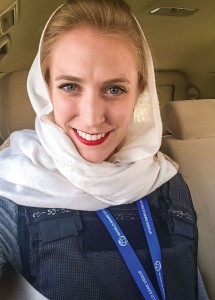Theory to Practice to World Bank: Rebekah Smith ’12

Rebekah Smith ’12 knew she wanted to work on global poverty from the time she was a child. But it wasn’t until an internship at a rural women’s microfinance firm in India, supported by a Theory-to-Practice Grant, that she saw what that work might look like. “The India trip allowed me to understand how the tools we learned in the economics classroom play out in the context of developing countries,” she says.
Smith was an international studies and economics double major at Ohio Wesleyan.
“For a small school in the middle of Ohio,” Smith says, “OWU does a great job of getting their students out into the world.”
Now she’s a migration policy consultant at the World Bank in Washington, D.C., working with countries to design systems that connect workers in one country to jobs in another. Her current focus is Afghanistan, where she travels about once a month. Her work has also taken her to Bangladesh, Saudi Arabia, Malaysia, and Thailand, among other locales.
She works to understand the migration context of a country: how many people are leaving; where, why, and how they are leaving; and what policies and institutions govern their exit. Then she works with the country’s government to create new policies or institutions to make it easier for people to get jobs in other countries, or for employers to hire workers from overseas.
“For example, this might include an employment and recruitment service which would help a worker learn about vacancies that match their skill set in another country, or a vocational course which helps a worker learn a skill that they need to be eligible to be hired in another country,” she says.
She also works to ensure that protection systems exist for workers abroad, so they have access to insurance or legal representation if something goes wrong.
Although her day-to-day work has not yet been affected by the new administration’s increased focus on tighter immigration policy, it’s an issue that looms large in her field. “For those of us who work on migration, there’s just a big rethink right now in terms of what strategies we use to try to achieve our goals,” she says.
“Migration is by far—and this is why I went into this as a field—the most powerful tool we have for poverty alleviation today. Its power to change lives is completely unparalleled,” she says, pointing to statistics that show the gross domestic product in countries that welcome immigrants grows, along with most worker wages.
OWU did exactly what a good liberal arts school should do—left me with more questions than answers.
Smith says she was initially attracted to OWU’s great balance of international diversity, interdisciplinary programs, and travel opportunities. Her India experience was inspired by an independent study on global poverty with Saif Rahman, Robert Bauman Associate Professor of Economics.
“My main advice to any OWU student is to take advantage of the professors!” she says. “I remember spending hours in the Economics Department talking with the professors. And it was about more than classes. I was trying to learn as much as I could about the world.”
Smith was also a member of the inaugural class of the Economics Management Fellows Program. “It was such a highlight to be so integrated into the Economics Department,” she says. “I still have close relationships with other people in the program.”
Smith continued her education at the Harvard Kennedy School of Government, graduating in 2014 with a master’s degree in public policy and receiving the 2014 Ellen S. Raphael Award for Academic Excellence and Public Service. She wrote her thesis in partnership with the World Bank, proposing the design of a government-sponsored business incubator for the information, communication, and technology sector for Gabon. Her previous work at the World Bank was in private-sector recovery for Sierra Leone after the Ebola crisis.
“OWU did exactly what any good liberal arts school should do—left me with more questions than answers,” she says. In class, she learned how economic theories should work. But in India, she learned how those theories actually looked in practice—and wanted to change them.
Smith credits her professional success to the mentors who worked with her along the way. “Professors have helped me get everything. They helped me get my job, and I’ve written research papers with them,” she says. “Those relationships are really enduring.”
– A.L. Davies ’19
